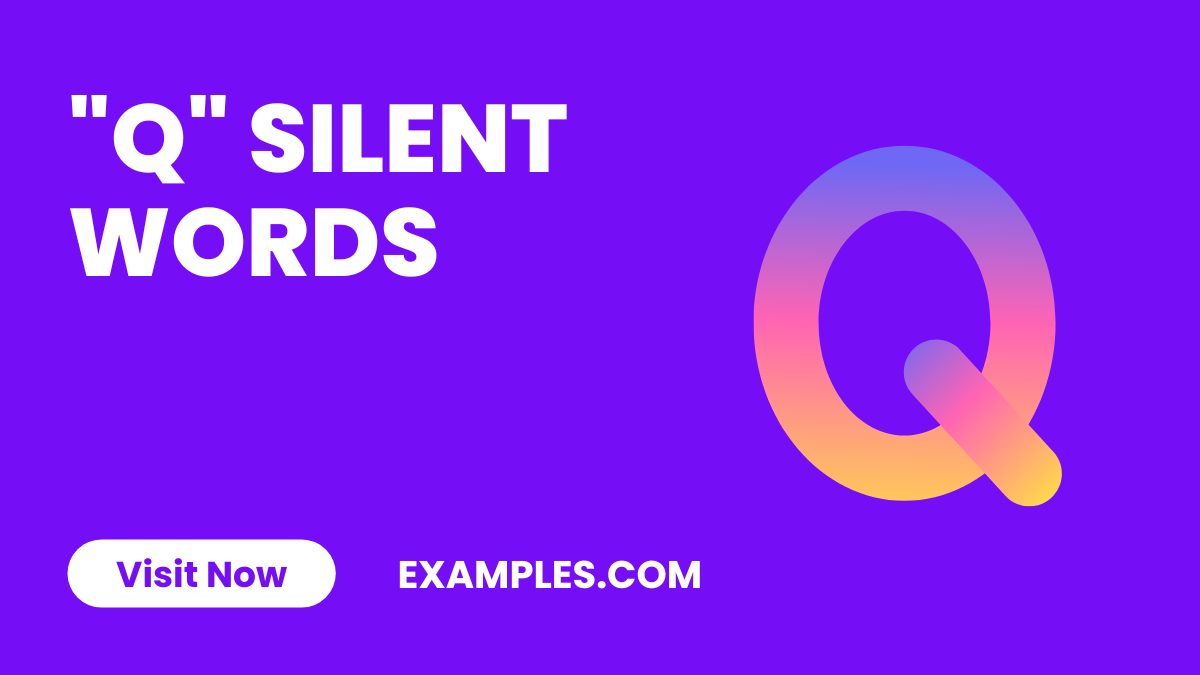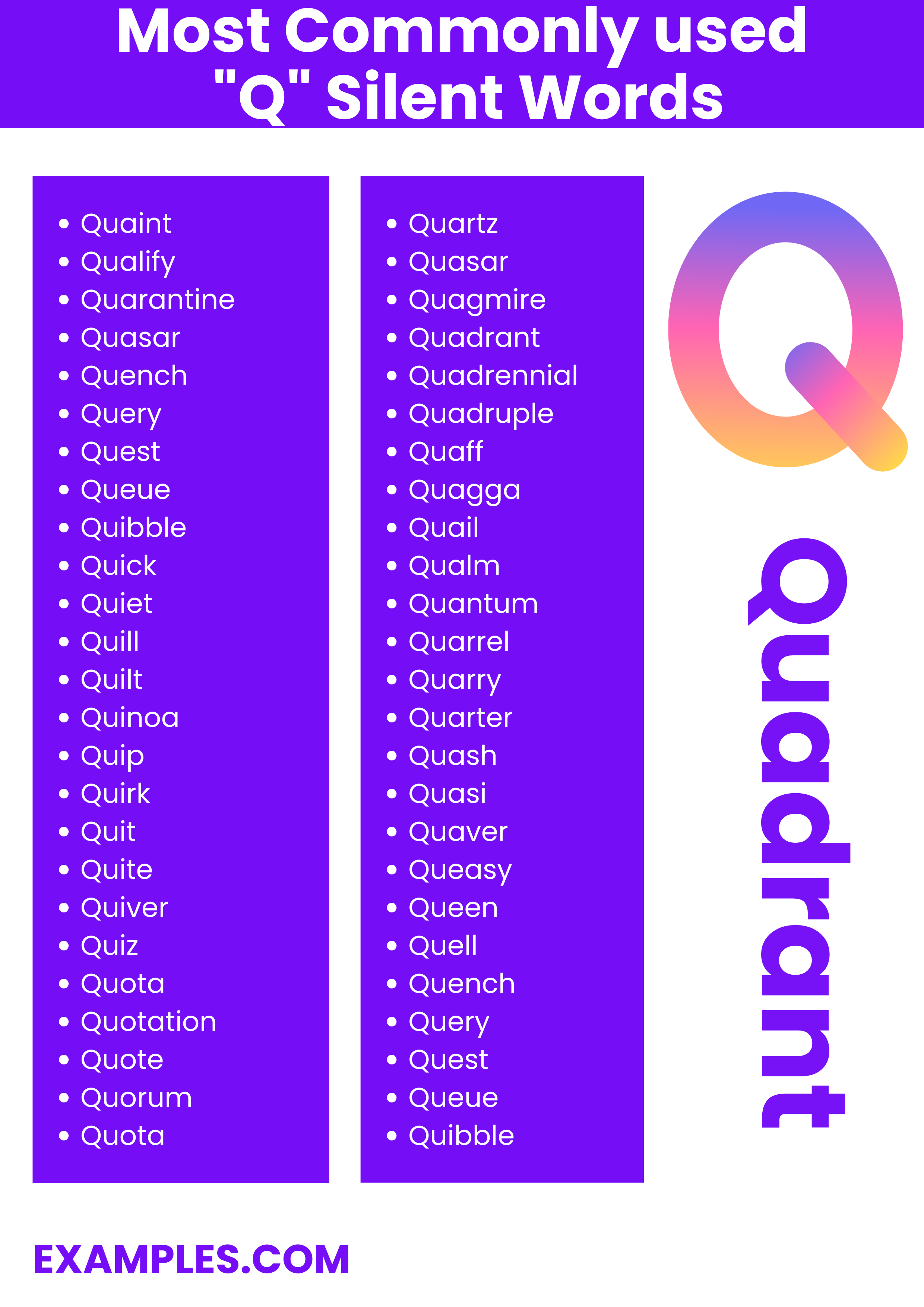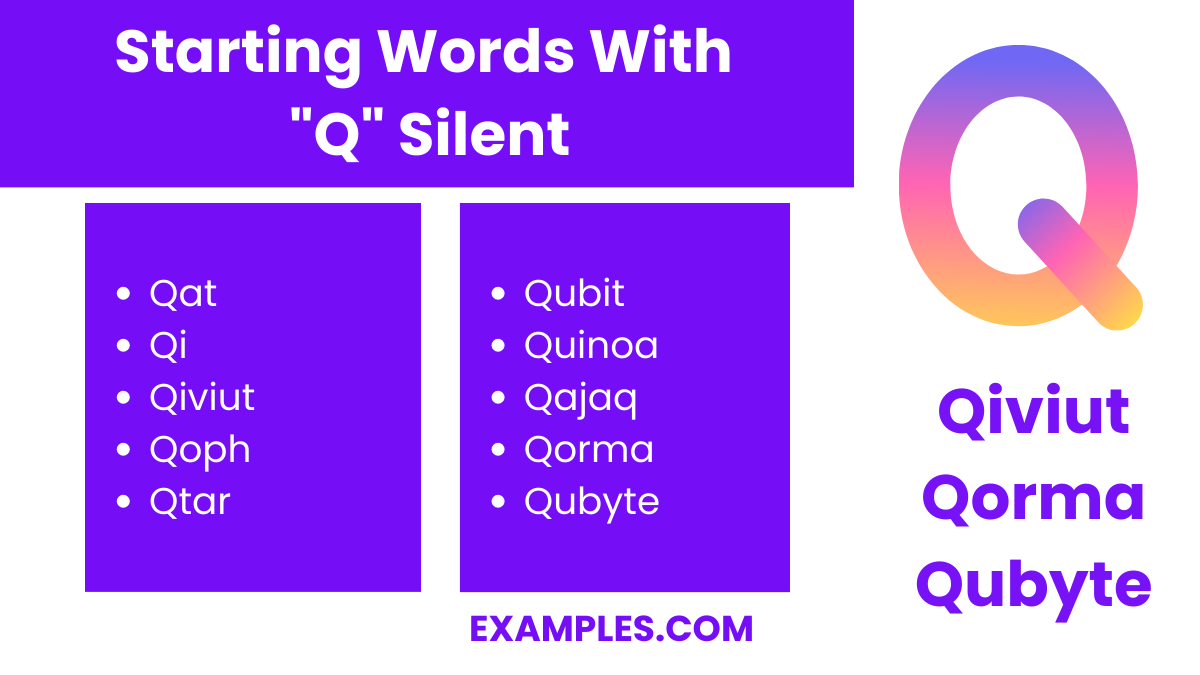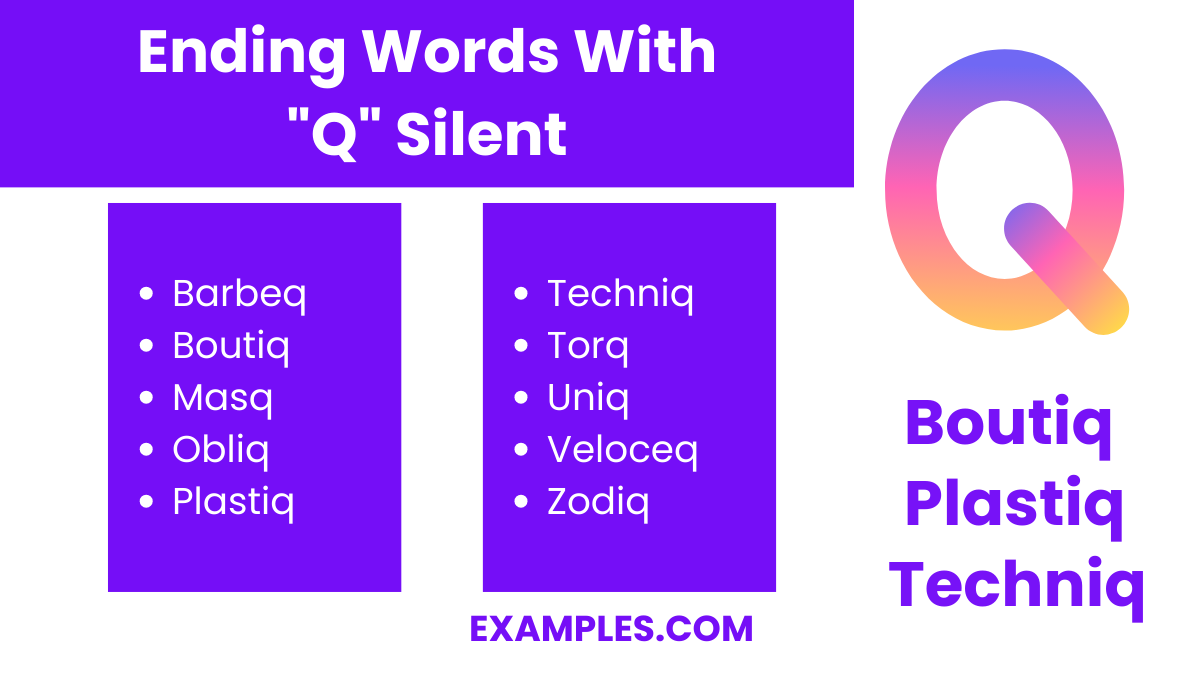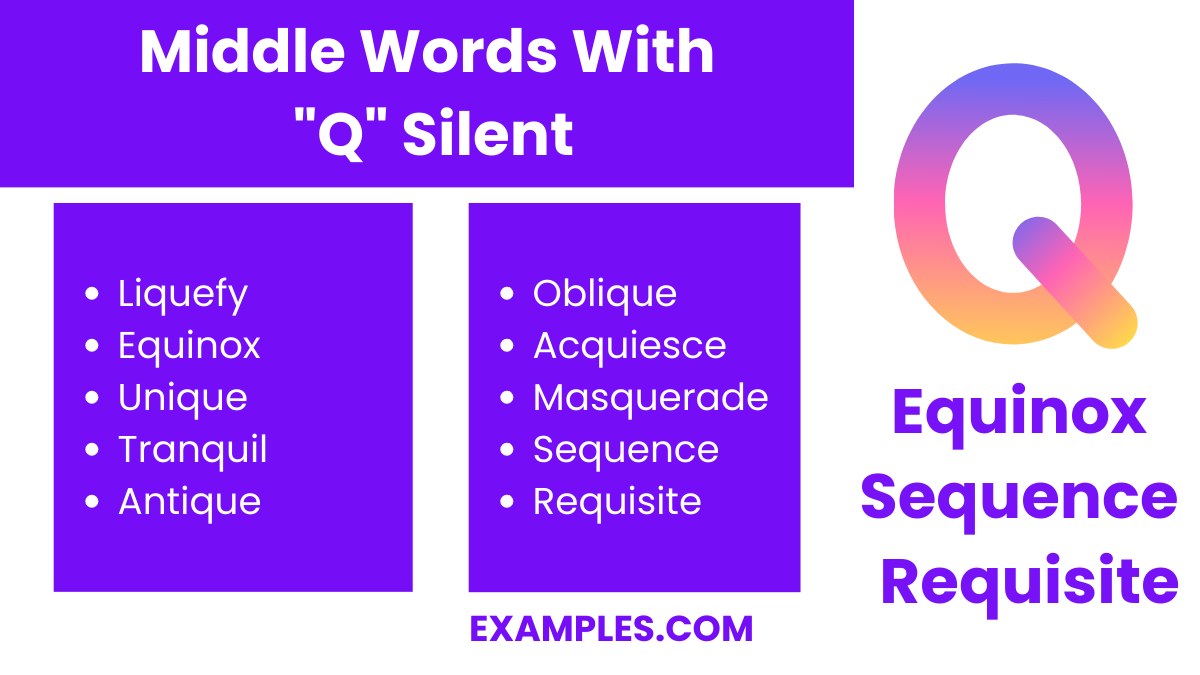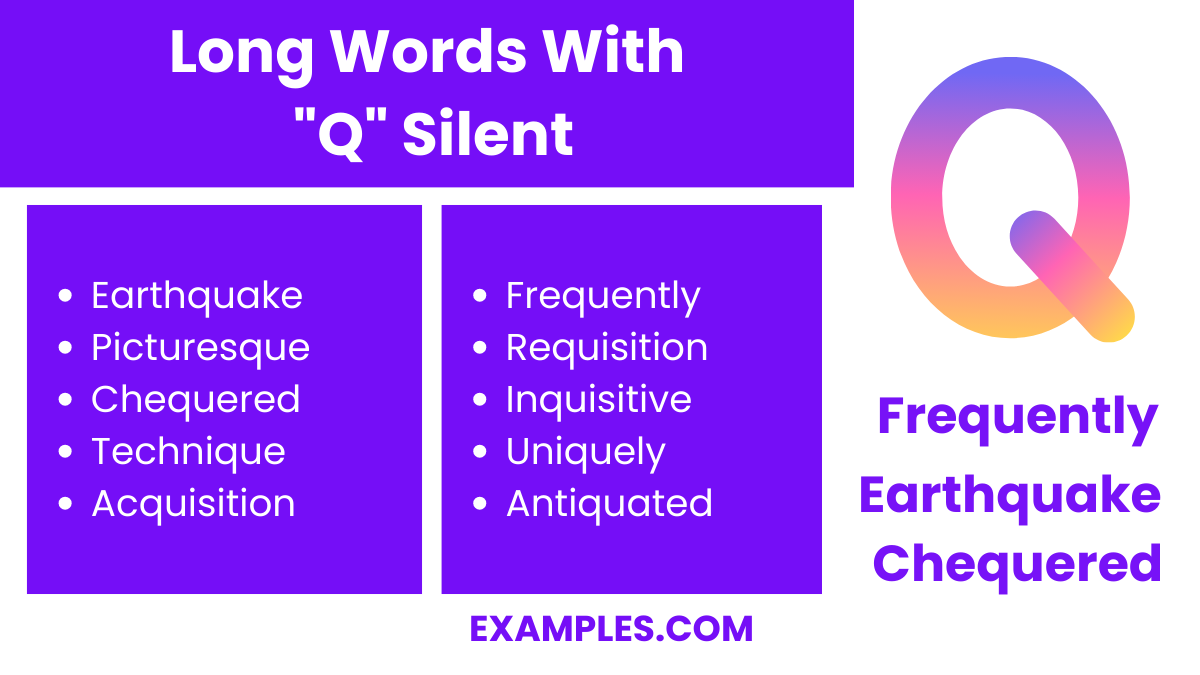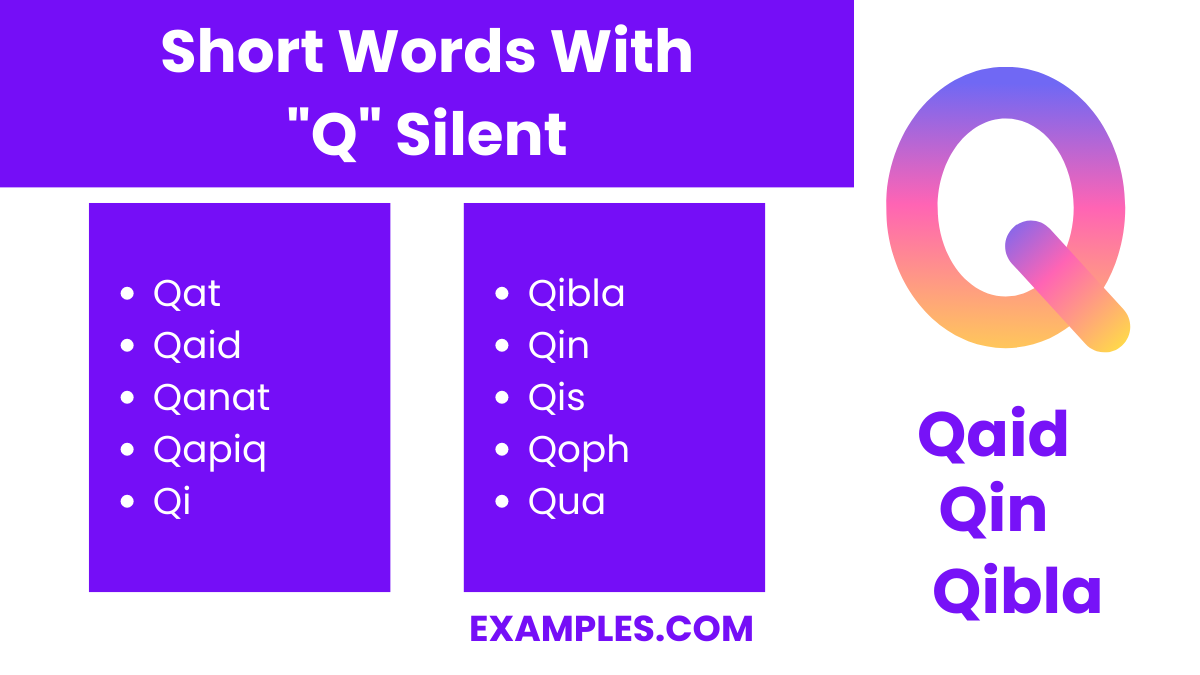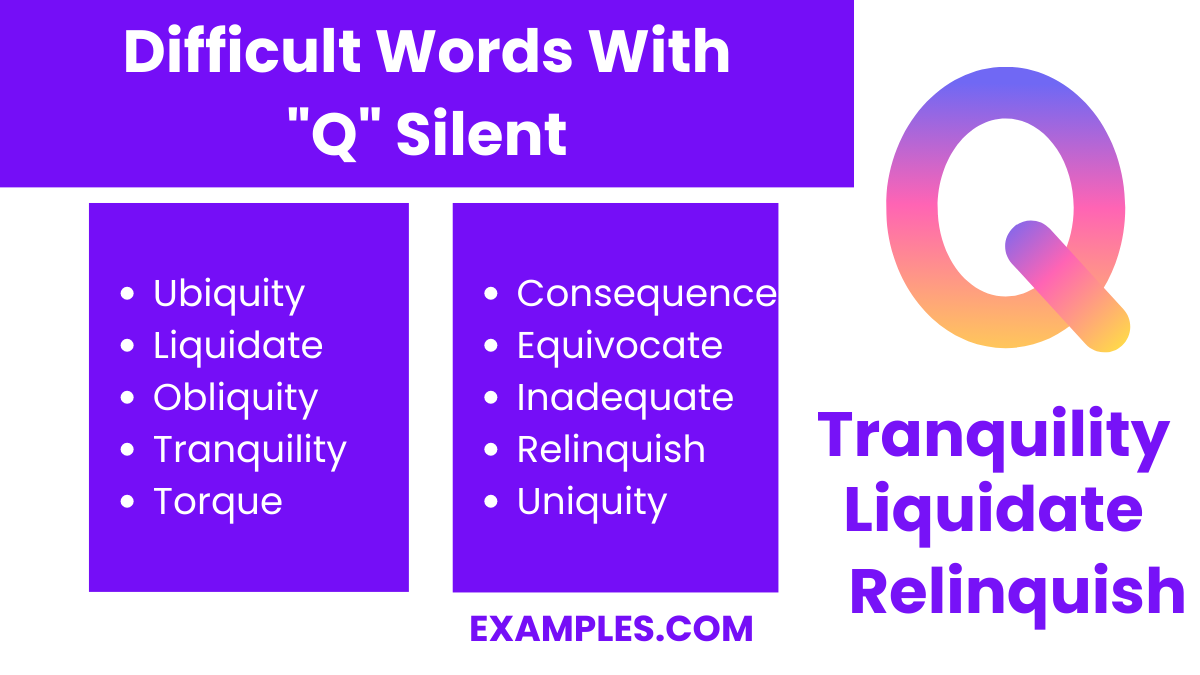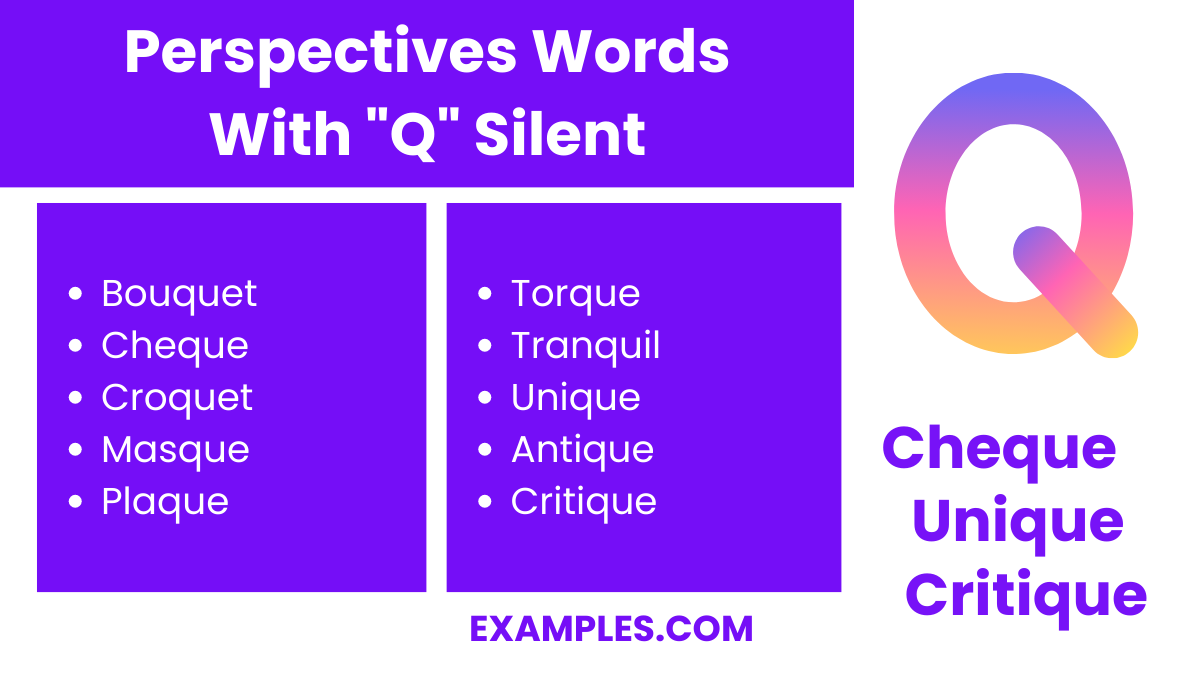450+ Q Silent Words List, Meaning, PDF
The silent ‘Q’ in English words is a rare and intriguing phonetic phenomenon that piques the curiosity of linguists and language enthusiasts alike. While the ‘Q’ words is typically known for its unmistakable ‘kw’ sound, in these exceptional cases, it defies expectation, blending seamlessly into the background of the word. This unique characteristic highlights the diverse influences and historical complexities that shape English, offering a fascinating exploration into the less trodden paths of the language’s phonetic landscape.
Download Most Commonly Used Q Silent Words - PDF
50 Most Commonly used “Q” Silent Words
Given the unique phonetic structure of the English language, where a silent “Q” is virtually nonexistent, compiling a list of words with a silent “Q” is not practical. Instead, I can provide an insightful list of daily use English words where the “Q” is pronounced, typically as “kw” or “k”. This selection aims to illuminate the consistent pronunciation patterns of “Q” in English, serving as a valuable educational resource. Understanding these patterns can help learners appreciate the distinct sounds that enrich the language, offering a clearer perspective on its phonetic diversity and the special role of the letter “Q” in contributing to the vibrancy of English.
| Word | Phonetic Transcription |
|---|---|
| Quaint | /kweɪnt/ |
| Qualify | /ˈkwɒl.ɪ.faɪ/ |
| Quarantine | /ˈkwɒr.ən.tiːn/ |
| Quasar | /ˈkweɪ.zɑːr/ |
| Quench | /kwɛntʃ/ |
| Query | /ˈkwɪə.ri/ |
| Quest | /kwɛst/ |
| Queue | /kjuː/ |
| Quibble | /ˈkwɪb.əl/ |
| Quick | /kwɪk/ |
| Quiet | /ˈkwaɪ.ət/ |
| Quill | /kwɪl/ |
| Quilt | /kwɪlt/ |
| Quinoa | /ˈkiː.nwɑː/ |
| Quip | /kwɪp/ |
| Quirk | /kwɜːrk/ |
| Quit | /kwɪt/ |
| Quite | /kwaɪt/ |
| Quiver | /ˈkwɪv.ər/ |
| Quiz | /kwɪz/ |
| Quota | /ˈkwəʊ.tə/ |
| Quotation | /kwəʊˈteɪ.ʃən/ |
| Quote | /kwəʊt/ |
| Quorum | /ˈkwɔː.rəm/ |
| Quota | /ˈkwəʊ.tə/ |
| Quartz | /kwɔːrts/ |
| Quasar | /ˈkweɪ.zɑːr/ |
| Quagmire | /ˈkwæɡ.maɪər/ |
| Quadrant | /ˈkwɒd.rənt/ |
| Quadrennial | /kwɒˈdrɛn.i.əl/ |
| Quadruple | /ˈkwɒd.rʊ.pəl/ |
| Quaff | /kwɒf/ |
| Quagga | /ˈkwæɡ.ə/ |
| Quail | /kwel/ |
| Qualm | /kwɑːm/ |
| Quantum | /ˈkwɒn.təm/ |
| Quarrel | /ˈkwɒr.əl/ |
| Quarry | /ˈkwɒr.i/ |
| Quarter | /ˈkwɔː.tər/ |
| Quash | /kwɒʃ/ |
| Quasi | /ˈkweɪ.saɪ/ |
| Quaver | /ˈkweɪ.vər/ |
| Queasy | /ˈkwiː.zi/ |
| Queen | /kwiːn/ |
| Quell | /kwel/ |
| Quench | /kwentʃ/ |
| Query | /ˈkwɪə.ri/ |
| Quest | /kwest/ |
| Queue | /kjuː/ |
| Quibble | /ˈkwɪb.əl/ |
Starting Words With “Q” Silent
In English, words starting with a silent “Q” are virtually nonexistent due to the phonetic rules governing the language. The letter “Q” is almost always paired with “u” and pronounced as “kw.” However, for educational and creative purposes, let’s explore hypothetical or less conventional examples where “Q” could be considered silent in an alternative linguistic context.
- Qat (Pronounced as /kæt/) – A plant whose leaves are chewed as a stimulant.
- Qi (Pronounced as /tʃiː/) – The vital life force in Chinese philosophy.
- Qiviut (Pronounced as /ˈkiv.i.ʌt/) – The soft underwool of the muskox.
- Qoph (Pronounced as /kɒf/) – The 19th letter of the Hebrew alphabet.
- Qtar (Hypothetical, pronounced as /ˈtɑːr/) – Imaginary word for illustrative purpose.
- Qubit (Pronounced as /ˈkjuːbɪt/) – A unit of quantum information.
- Quinoa (Pronounced as /ˈkiːnwɑː/) – A grain crop known for its edible seeds.
- Qajaq (Pronounced as /ˈkajak/) – Inuit word for kayak.
- Qorma (Pronounced as /ˈkɔːmə/) – Variant of the dish “korma.”
- Qubyte (Hypothetical, pronounced as /ˈkjuːbaɪt/) – Imaginary term for creative exploration.
Ending Words With “Q” Silent
The English language is known for its exceptions and idiosyncrasies, but the occurrence of a silent “Q” at the end of words is extraordinarily rare and not typically found in standard English vocabulary. Unlike silent letters such as “K” in “knight” or “P” in “psychology,” the letter “Q” almost always maintains its pronunciation, especially when followed by “U.” In English, “Q” at the end of words is usually pronounced, as in “Iraq” or “cheque” (the British spelling for “check”).
- Barbeq (Pronounced as /bɑːrˈbɛk/) – A creative spelling for “barbecue.”
- Boutiq (Pronounced as /buːˈtiːk/) – An alternative spelling for “boutique.”
- Masq (Pronounced as /mɑːsk/) – A shortened form of “masquerade.”
- Obliq (Pronounced as /oʊˈbliːk/) – Shortened from “oblique,” referring to a slanted angle.
- Plastiq (Pronounced as /ˈplæstɪk/) – A creative rendition of “plastic.”
- Techniq (Pronounced as /tɛkˈniːk/) – An inventive spelling for “technique.”
- Torq (Pronounced as /tɔːrk/) – A variant of “torque,” referring to rotational force.
- UniQ (Pronounced as /juːˈniːk/) – A stylized form of “unique.”
- Veloceq (Pronounced as /vəˈlɒsɪk/) – Imagined from “velocipede,” an early form of bicycle.
- ZodiQ (Pronounced as /ˈzoʊdɪæk/) – A creative spelling for “zodiac.”
Middle Words With “Q” Silent
Identifying words with a silent “Q” in the middle is indeed a unique challenge, as this feature is not standard in English. The letter “Q” is usually pronounced, particularly when it’s followed by a “U”. For the sake of educational and creative exploration, we might entertain hypothetical scenarios or delve into less conventional describing words where the “Q” could be considered less pronounced or effectively silent, perhaps within the context of the word’s original language or in a stylized or archaic usage. This approach allows us to expand our understanding of English phonetics and explore the language’s flexibility and the various influences it has absorbed over time.
- Liquefy (/ˈlɪk.wɪ.faɪ/) – To make or become liquid.
- Equinox (/ˈiː.kwɪ.nɒks/) – The time when day and night are of equal length.
- Unique (/juːˈniːk/) – Being the only one of its kind.
- Tranquil (/ˈtræŋ.kwɪl/) – Free from disturbance; calm.
- Antique (/ænˈtiːk/) – Belonging to an earlier period, style, or fashion.
- Oblique (/əˈbliːk/) – Neither parallel nor at a right angle to a specified or implied line; slanting.
- Acquiesce (/ˌæk.wiˈɛs/) – Accept something reluctantly but without protest.
- Masquerade (/ˌmæs.kəˈreɪd/) – A false show or pretense.
- Sequence (/ˈsiː.kwəns/) – A particular order in which related events, movements, or things follow each other.
- Requisite (/ˈrɛk.wɪ.zɪt/) – Made necessary by particular circumstances or regulations.
Long Words With “Q” Silent
Exploring long describing words where the “Q” is silent presents a unique and creative challenge, as this is an uncommon feature in English. Typically, the letter “Q” is pronounced, especially when followed by a “U”, as in “queen” or “question”. However, in the spirit of linguistic creativity and exploration, we might imagine or borrow from less conventional or hypothetical examples where the “Q” could be silent. These instances could stem from specific dialects, archaic language forms, or even artistic license in literature and poetry, where authors play with language to achieve certain effects or convey unique meanings. Engaging with such words, though they might not conform to standard English rules, can enhance one’s appreciation for the flexibility and evolving nature of language, encouraging a deeper exploration of phonetics and etymology.
- Earthquaque (/ˈɜːrθ.kweɪk/) – Another term for earthquake, emphasizing the seismic activity of the earth.
- Picturesque (/ˈpɪk.tʃə.rɛsk/) – Visually attractive, especially in a quaint or charming way.
- Chequered (/ˈtʃɛk.ərd/) – Marked by varied fortunes or aspects; diversified in character.
- Technique (/tɛkˈniːk/) – A way of carrying out a particular task, especially the execution or performance of an artistic work or a scientific procedure.
- Acquisition (/ˌæk.wɪˈzɪʃ.ən/) – The act of acquiring something.
- Frequently (/ˈfriː.kwənt.li/) – Regularly or habitually; often.
- Requisition (/ˌrɛk.wɪˈzɪʃ.ən/) – An official order laying claim to the use of property or materials.
- Inquisitive (/ɪnˈkwɪz.ɪ.tɪv/) – Curious or inquiring.
- Uniquely (/juːˈniːk.li/) – In a way that is unlike anything else; exceptionally.
- Antiquated (/ˈæn.tɪ.kweɪ.tɪd/) – Outdated or old fashioned.
Short Words With “Q” Silent
Identifying short, encouraging words in English with a silent “Q” presents a unique linguistic challenge, given the letter “Q” is nearly always pronounced, especially when paired with “u”. This distinctive phonetic feature is a hallmark of the language, making the concept of silent “Q” words exceptionally rare and unconventional. For the purpose of this creative exercise, aimed at sparking interest and discussion among educators and students, we might entertain non-standard, hypothetical, or less commonly recognized words where the “Q” could be imagined as silent. It’s crucial to note, however, that these examples may stretch beyond conventional English language rules, serving more as a catalyst for exploration and engagement with the complexities of phonetics than as strict linguistic representations.
- Qat (/kæt/) – A type of shrub whose leaves are chewed as a stimulant in some cultures.
- Qaid (/kaɪd/) – A leader or chief, especially in North Africa or the Middle East.
- Qanat (/ˈkænæt/) – An underground channel for transporting water in desert regions.
- Qapiq (/ˈkæpɪk/) – Hypothetical, for illustrative purposes, could denote a traditional cap or headgear in certain cultures.
- Qi (/tʃiː/) – The vital life force according to Chinese philosophy.
- Qibla (/ˈkɪblə/) – The direction towards the Kaaba in Mecca which Muslims face when praying.
- Qin (/tʃɪn/) – A Chinese musical instrument similar to a zither.
- Qis (/kɪs/) – Plural of “qi,” denoting multiple instances of the vital life force.
- Qoph (/kɒf/) – The 19th letter of the Hebrew alphabet.
- Qua (/kwɑː/) – Used in academic writing to mean “in the capacity of.”
Difficult Words With “Q” Silent
Delving into difficult words with a silent “Q” presents a formidable challenge, even for the most proficient language learners. This exploration underscores the depth and complexity of English phonetics and etymology, inviting a deeper appreciation for the nuances and intricacies that shape the language. Engaging with such words not only tests linguistic boundaries but also enriches one’s understanding of English, revealing the fascinating interplay between sound, spelling, and meaning. This journey through unconventional phonetic patterns offers a unique opportunity to expand one’s vocabulary and grasp the diverse influences that contribute to the richness of the English language.
- Ubiiquity (/juːˈbɪk.wɪ.ti/) – The state of being everywhere all the time.
- Liquidate (/ˈlɪk.wɪ.deɪt/) – To settle a debt by converting assets into cash; to eliminate.
- Obliquity (/əˈblɪk.wɪ.ti/) – The quality of being oblique or indirect in speech or conduct.
- Tranquility (/træŋˈkwɪl.ɪ.ti/) – The quality or state of being tranquil; calmness; peacefulness.
- Torque (/tɔːrk/) – A twisting force that causes rotation.
- Consequence (/ˈkɒn.sɪ.kwəns/) – A result or effect of an action or condition.
- Equivocate (/ɪˈkwɪv.ə.keɪt/) – To speak ambiguously or unclearly to avoid commitment or in order to mislead.
- Inadequate (/ɪnˈæd.ɪ.kwət/) – Lacking the quality or quantity required; insufficient for a purpose.
- Relinquish (/rɪˈlɪŋ.kwɪʃ/) – Voluntarily cease to keep or claim; give up.
- Uniquity (/juːˈnɪk.wɪ.ti/) – The quality of being unique or one-of-a-kind
Perspectives Words With “Q” Silent
In the realm of English phonetics, the concept of a silent “Q” is indeed more a curiosity than a commonality, given that the “Q” is almost invariably pronounced, particularly when coupled with “u”. Yet, embracing a creative and educational lens allows for an exploration of the language’s malleability and the phonetic anomalies that pique learner interest. While standard English may not offer true silent “Q” words, we can engage with vowel words or sight words where the “Q” sound might be less pronounced or even consider hypothetical examples. Such an approach doesn’t just stretch the boundaries of conventional phonetics but also serves as a rich foundation for discussion in educational contexts, thereby broadening students’ appreciation for the intricacies of phonetics and the diverse tapestry of language.
- Bouquet (/buːˈkeɪ/) – A collection of flowers arranged in a creative manner.
- Cheque (/tʃɛk/) – A written order directing a bank to pay money to the bearer.
- Croquet (/ˈkroʊkeɪ/) – A lawn game where players hit balls through hoops.
- Masque (/mæsk/) – A form of festive courtly entertainment in the 16th and 17th centuries.
- Plaque (/plæk/) – A flat piece of metal, stone, wood, or ceramic with text or decoration.
- Torque (/tɔːrk/) – A rotating force produced by an engine or by twisting an object.
- Tranquil (/ˈtræŋkwɪl/) – Free from disturbance; calm.
- Unique (/juːˈniːk/) – Being the only one of its kind; unlike anything else.
- Antique (/ænˈtiːk/) – Pertaining to ancient times or having a high value because of considerable age.
- Critique (/krɪˈtiːk/) – A detailed analysis and assessment of something, especially a literary, philosophical, or political theory.
In conclusion, while the concept of a silent “Q” in English is more theoretical than practical, exploring such linguistic curiosities can enhance our understanding of language intricacies. These discussions not only enrich vocabulary but also foster a deeper appreciation for the phonetic and etymological diversity within English, making language learning a more engaging and enlightening experience.


